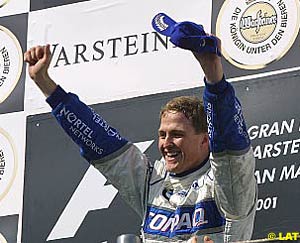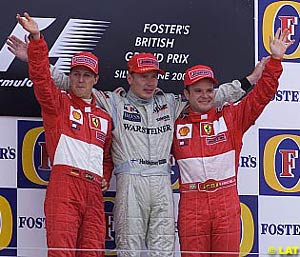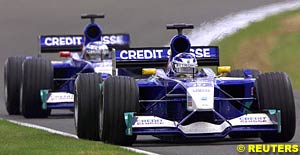
This week's Grapevine brings you |
As the British Grand Prix wound to a close, with Montoya in fourth place, the Williams team considered the implications of their idea of team orders, and the impact to the team of losing a potential podium place.
Of course, given that Montoya obeyed team orders and followed Ralf around the circuit over half a dozen laps, rather than attempting a pass in order to maximise the potential of his two stop strategy, no-one will ever know if he could have passed Barrichello. Given the Brazilian pitted second, some would argue not, but Montoya had looked good at Silverstone all weekend, and could arguably have discovered a route past Barrichello, as he had already managed to get past Michael Schumacher earlier in the race.
Patrick Head, in particular, is widely reported as being disappointed with Ralf's conduct; however, despite the events of the last two GP seeing Ralf ignore team orders, the outspoken technical front man is not yet blasting Schumacher in public. Ralf believes, and his lap times bear it out, that his pace was sufficient to beat Barrichello to a podium place. Giving up track position to Montoya, on the off-chance the Colombian would pass the Brazilian, could have jeopardised that podium place; being as close as possible ahead of the pitstop was key to the one stop strategy.
Of course, as Schumacher suffered yet another failure, it will never be known if he could have beaten Barrichello to the last podium position. Vindication would alleviate Head's concerns that the German believes himself beyond playing the team game - which is ironic, considering Williams are known for demonstrating their belief that drivers should be allowed to race.
In post mortem, Head is telling the shop floor at Grove that Williams should have had a podium. Between poor reliability, and poor teamwork, they cost themselves at least a point more. Potentially, Williams could have seen both third and fourth place, despite Michelin being behind Bridgestone for the event, so three points from the day just doesn't add up.
Facing accusations of working towards a World Championship, and conceding the Silverstone win to McLaren, Ferrari are somewhat bemused.
It's true that Mika Hakkinen won the race. But they scored as many points with their second and third place results - and extended Schumacher's lead in the driver's Championship. Hardly the outcome expected of a team working solely for the long term.
McLaren's calculations established that running a two stop strategy was worth nearly forty seconds over a single stop. Going from the front, Schumacher should have been capable of establishing a strong position, and even if held up behind a single stopping car for a period, could have won comfortably. Accordingly, they loaded their cars for a two stop race, and won it, as they predicted they should, if facing a single stop from Ferrari.
Of course, if they had had access to Ferrari's data, things would have seemed somewhat different. According to Ferrari's calculations, two stops would have only saved around twenty seconds. With that little advantage, passing a car on a single stop strategy was far from a given. Furthermore, the distinct possibility of rain implied that operating with full tanks - and a flexible approach to pitstops - could see the team benefit considerably.
In the event, Schumacher did not extract the performance the team has come to expect from his car - it is rare for the German to have an off day, but it does happen, and on Sunday, he struggled with balance through most of the circuit, particularly around Copse. Of course, even on a bad day, Schumacher is a formidable competitor, but it was not enough to seriously delay the two stopping Hakkinen or Montoya. Notwithstanding a difficult race, and flexible strategy, the World Champion elect finished second, and took some comfort from the result.
McLaren believe Ferrari's strategy flattered them, and to some extent, perhaps it did, to the tune of a few seconds. But at the end of the day, the teams use their tyres differently, and show slightly different improvements in tyre wear, and hence outright pace, as the fuel loads drop.
Going to Silverstone, Peter Sauber intimated his team's intention to consolidate fourth place in the Constructor's Championship, even as both Jordan and BAR made all the noises about doing the same as they approached their home Grand Prix. Unlike their Honda powered rivals, the Swiss team lived up to their promises, bringing home the points for fifth and sixth place finishes, extending their hold on fourth place.
Sauber, on the other hand, saw an opportunity to cement their position. The team has a smaller budget than most for in-season development, and has suffered badly in the past from losing ground to the competition. However, this year's car is something of a gem. Not only is it relatively easy to set up and drive, but evolving it has proven to be a process of moving towards the conclusions implied by the original design. This is a serious benefit, because research and development is concentrated into a few tightly defined areas, which saves time and effort being thrown away on lost causes. Going to Silverstone, improved software was a key component, alongside some very under-publicised evolutions to the undertray. Downforce was improved with no significant change in drag, and the team arrived in an optimistic frame of mind.
In the event, Jordan finally discovered the sweet spot on their car for qualifying, which gave Sauber some pause for thought. The yellow car certainly has potential, but come race time, they self destructed again, and Sauber proved their point.
They are clearly the best of the rest in 2001.
![]() Williams Ponder a Podium
Williams Ponder a Podium
 When Ralf Schumacher refused to give Juan Pablo Montoya the room to pass, a funny thing happened. The normally racing oriented Williams team told the Colombian to lean his mixture out, and take it easy - an implicit instruction to leave Ralf to tackle Rubens Barrichello. What Montoya was not told, was that Ralf had point blank stated his intention not to yield to his temporarily faster teammate, for fear it would compromise his own, hard fought, challenge for a podium position.
When Ralf Schumacher refused to give Juan Pablo Montoya the room to pass, a funny thing happened. The normally racing oriented Williams team told the Colombian to lean his mixture out, and take it easy - an implicit instruction to leave Ralf to tackle Rubens Barrichello. What Montoya was not told, was that Ralf had point blank stated his intention not to yield to his temporarily faster teammate, for fear it would compromise his own, hard fought, challenge for a podium position.
![]() Strategic War-Mongering
Strategic War-Mongering
 However, it is interesting to note that the needling was based on two different approaches to the race.
However, it is interesting to note that the needling was based on two different approaches to the race.
![]() Sauber Pulling No Punches
Sauber Pulling No Punches
 It's no accident that the Swiss team went well at Silverstone. The event was always going to be tough - most of the teams consider it their home event, after all - so preparation was a big key to success. The strange thing is, Sauber learned early on that most of the teams appeared to be targeting the French Grand Prix at Magny Cours, rather than the British event. Evolutions for that race would largely be restricted to normal components coming through testing; otherwise, it is all about setup.
It's no accident that the Swiss team went well at Silverstone. The event was always going to be tough - most of the teams consider it their home event, after all - so preparation was a big key to success. The strange thing is, Sauber learned early on that most of the teams appeared to be targeting the French Grand Prix at Magny Cours, rather than the British event. Evolutions for that race would largely be restricted to normal components coming through testing; otherwise, it is all about setup.
Please Contact Us for permission to republish this or any other material from Atlas F1.
|
Volume 7, Issue 29
Atlas F1 Exclusive
Interview with Button
Tales from the Thirties: Tripoli, 1933
British GP Review
The British GP Review
Reflections from Silverstone
The Final Straw
Columns
Season Strokes - the GP Cartoon
Qualifying Differentials
The Weekly Grapevine
> Homepage |
